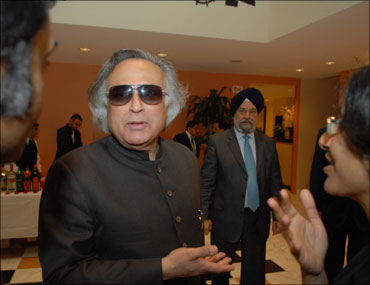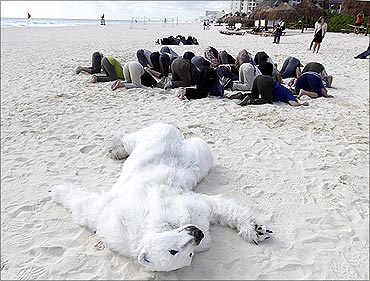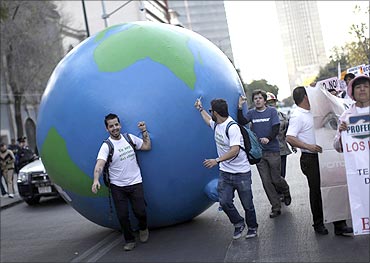Photographs: Paresh Gandhi/Rediff.com
The Bharatiya Janata Party and the Left parties, along with the green lobby, on Friday attacked Environment Minister Jairam Ramesh accusing him of a 'sell out' on the issue of accepting globally legally binding emission cuts by deviating from India's position that it will not agree to any such pact.
Stating that Jairam has acted unilaterally, they asked the government to come clean on the matter alleging that the 'shift' in stance was done under pressure from the developed nations, particularly the United States.
They were reacting to Ramesh's statement made on Thursday at the ongoing UN climate summit in Cancun, Mexico that "all countries must take on a binding commitment under an appropriate legal form".
The BJP alleged that India had weakened its position by kowtowing before the US.
. . .
Ramesh 'sold out' India on climate issue: BJP, Left
Photographs: Reuters
"It's a unilateral decision which has weakened India's negotiating position. India is buckling under pressure from the US which itself has not undertaken any commitments," BJP spokesperson Prakash Javedkar said.
He said that his party would ask the government to must come clean. "It is not necessary for India to take upon itself the legal binding commitments. It will have impact on country's economy. We are scared," he added.
CPI(M) Politburo too sharply reacted to the issue saying, with party leader Brinda Karat saying, "This is a sell out. It is extremely unfortunate that this should have happened.
Condemning the government move, the politburo said, "Such a statement by the Environment Minister cannot be seen as an individual one. It should be taken as representing the view of the UPA government."
. . .
Ramesh 'sold out' India on climate issue: BJP, Left
Photographs: Reuters
It reminded the government that it had assured Parliament that India would not accept any such binding commitments and demanded that the government reiterate the stand that it cannot agree to any legally binding emission cuts.
The party, in a statement, also accused the government of aligning with the US, "as in many other matters even if it means going against the vital interests of the country".
India like many other countries has so far been opposed to any binding emission cuts despite repeated demands from the developed nations but Ramesh's announcement is a major departure at the 17-year-long climate talks.
Defending his announcement, Ramesh has maintained that "I have nothing to hide. I stand by it. Everything is being done transparently. This is being done to strengthen India's stance as it was being isolated. India at Cancun has come out looking more proactive."
. . .
Ramesh 'sold out' India on climate issue: BJP, Left
Photographs: Reuters
However, this has not impressed environmentalists who are crying foul saying it will remove the distinction between developing and developed countries.
Prodipto Ghosh, former environment secretary and distinguished fellow at The Energy Research Institute (TERI), minced no words when he said, "it is a clear departure from what he (Ramesh) had told Parliament."
"I feel that the reason for India (not to take binding emission cuts) were very sound. But now there is no explanation from the government or the minister for making the U-turn in the position."
Ghosh, who was one of Indian negotiators at Copenhagen climate meet last year, did not agree with Ramesh's contention that neighbouring nations like Nepal and Bangladesh were seeking binding commitments from it and that it stood isolated.
. . .
Ramesh 'sold out' India on climate issue: BJP, Left
Photographs: Reuters
"It is a matter of our development process. It is a matter of diplomacy and if it is in our interest, we have to walk alone," he added.
Sunita Narain of Centre for Science and Environment (CSE) termed the shift as "disastrous" and "betrayal" of the people of the country.
"India is buckling under pressure from developed nations. Since Copenhagen climate meet last year, we have given so much by voluntary offering reduction in emission intensity cuts by 20-25 per cent by the year 2020. But in return we are getting peanuts," she said.
Narain was referring to the US reluctance to ratify the treaty to accept legally binding emission cuts as well pass a domestic law for stringent climate actions.
In contrast, she noted, Ramesh in a pre-CoP (Conference of the Parties) meeting in Mexico had taken the first step towards internationalising India's domestic commitments by agreeing on International Consultation and Analysis (ICA) of domestic actions.
. . .
Ramesh 'sold out' India on climate issue: BJP, Left
Photographs: Reuters
Earlier, under attack from opposition parties and NGOs back home, Environment Minister Jairam Ramesh on Friday admitted to 'nuancing' of the Indian position that it will not accept internationally legally binding emission cuts.
He said there has been no shifting of the goal post and that he stood by India's position that it will not accept internationally binding cuts 'at this stage' because he does not know what the conditions that accompany them are.
He justified the nuancing of the Indian position in his speech on Thursday in which he said that all countries must take on binding commitments under an appropriate legal form, saying it was done so that India is 'not isolated'.
"There is no shift in the position, only nuancing," he told PTI, pointing out that India was trying to find room for 'maneuovre' due to increasing pressure from developing nations.
"We remain anchored in non-negotiable but we are expanding our options," he said.
"All I said was that all countries must take binding commitments in appropriate legal form. This does not mean that India is taking on a legally binding agreement at this stage. That's our position," Ramesh said.
"Negotiations is all about flexibility, negotiations is all about seeing what is happening and responding creatively. I think frankly, I have not changed the goal post, I have nuanced our position. Our positions remains let me say we will not accept a legally binding agreement at this stage," he told reporters.
"We are not the bad guys, that's very important for India not to be isolated in any of these international forums and we have a larger stake in the world economy today than we had perhaps 25 years ago," the minister said.







article